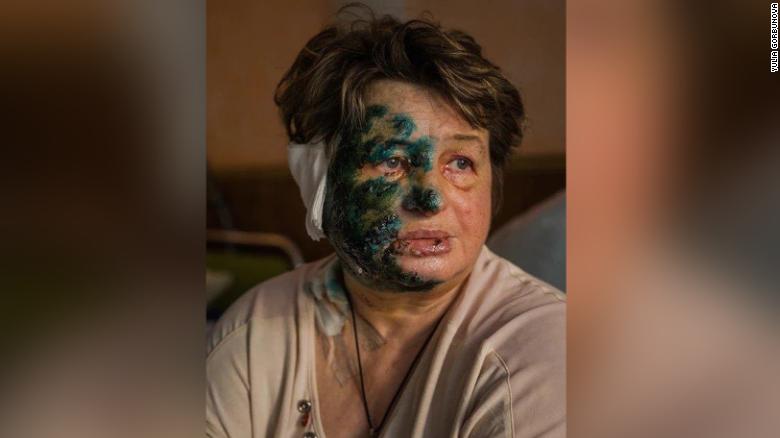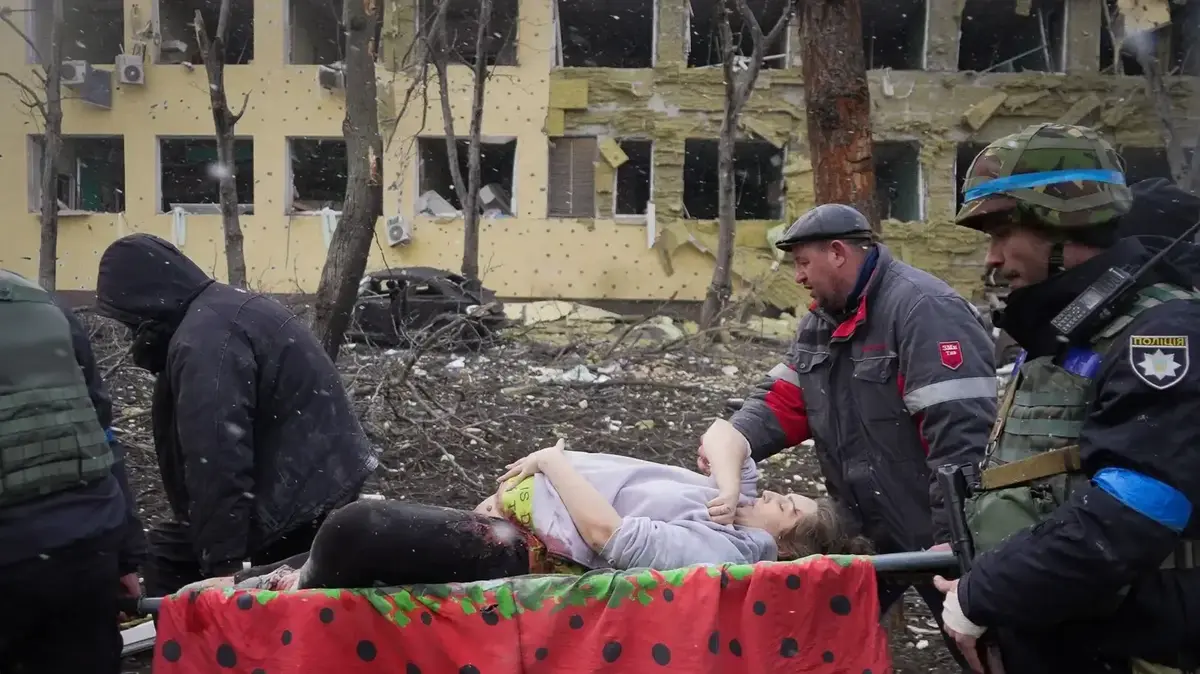Civilians evacuated as Mariupol situation worsens 2:11
Editor's note:
Yulia Gorbunova is a lawyer and senior researcher at Human Rights Watch in Ukraine, where she has previously investigated the armed conflict in Donbas, human rights abuses in Crimea, and more recently the atrocities in Bucha and Mariupol.
The opinions expressed in this comment belong solely to the author of it.
Lviv, Ukraine (CNN) --
On March 15, Halyna Moroskhovskaya was cooking soup for 172 people at the municipal residence she ran in Mariupol.
Like her, residents were sheltering in temporary accommodation as Russian forces relentlessly shelled her hometown.
At one point, the explosions were so bad that Halyna, 59, ran to the basement every time she added another ingredient to the pot.
"She adds carrots, runs to the cellar, adds potatoes, runs to the cellar," she told me last week at a hospital in Lviv, a western Ukrainian city that has become something of a haven in the country.
It is here that Halyna and her daughter, Nataliya, 37, are being treated for devastating injuries they sustained when an explosion rocked their residence earlier that day.
Halyna Moroskhovskaya, 59, pictured with an antiseptic on her face in a Mariupol hospital after suffering a seizure.
"March 15 was a black day," Halyna said.
When the shelling got worse, Nataliya finally convinced her mother and her husband, Andrii, to flee.
They were gathered in a room on the second floor, discussing their evacuation plans, when the attack hit them.
Mass graves near besieged Ukrainian city of Mariupol are evidence of war crimes, Ukrainian officials say
Halyna said she heard a buzz.
Her ears started ringing, she was stunned.
The next thing she knew, her face was bleeding and the right side of her body seemed to be on fire.
She saw Andrii beside her, frantically sifting through the rubble, dust, and shards of glass.
Nataliya was buried under her, with only her foot sticking out.
advertising
Nataliya lost her right eye.
She also suffered a fractured skull and jaw.
The young woman had a broken arm and multiple deep cuts on her face.
Her mother was also seriously injured.
She showed me the deep, unhealed cuts all over her right side, thigh, knee, and ankle.
Nataliya, who is in a Lviv hospital with her husband Andrii, lost her right eye during an attack in Mariupol in mid-March.
Two other people were in the room with them at the time.
They both died.
Nataliya's sons Maksym, 5, and Eduard, 19, were in the basement during the attack and were unharmed.
Mariupol, on the northern coast of the Sea of Azov, has been under relentless attack by Russian forces since early March.
Civilians who fled Mariupol described it as hell on Earth;
a once-beautiful city, damaged beyond recognition, its buildings blackened and destroyed by constant Russian bombardment, its streets littered with corpses, debris, and shell fragments.
It's not the only one.
As a researcher for Human Rights Watch, I have spoken with dozens of people who have fled bombing in numerous cities in Ukraine.
I have spoken with people who feared for their lives, who simply wanted to find safety for themselves and their children, and who told me of the appalling violence they have witnessed during this war.
Mother and daughter Halyna and Nataliya at a birthday party in Mariupol, May 2021.
Like many others in Ukraine, in a matter of weeks, Halyna's family had lost their home and everything they owned.
They were about to lose their lives.
Without electricity or gas since early March, residents of Mariupol had started cooking over open fires near the entrances to their buildings.
That's why, Halyna told me, on the day of the attack she was cooking soup outdoors, in a huge 30-litre pot.
Among the people Halyna had been caring for at the residence were at least 50 children and several elderly people who were not very mobile.
Nataliya had been trying for weeks to convince Halyna to run away, but she resisted because she felt guilty leaving behind people who had no car or other means of getting around.
"I felt responsible for them," she said.
“We want to live”: the desperate request of civilians in Mariupol 1:28
After the explosion at the residence, Halyna and Nataliya were taken to Mariupol Hospital No. 3.
It was a horrible image, dark and practically deserted, with pools of blood on the ground.
Most of the doctors and other health personnel had fled.
The doctor who stitched up the lacerations on Halyna's face kept pleading with her to hang on amid a dire shortage of medication to ease her pain.
The pain was excruciating, she said, but she knew it was worse for her daughter.
The family spent 36 hours in hospital, with Halyna sleeping on a bench in the hallway, as the shelling continued.
There were no doctors or nurses to change the dressing on her wounds.
Two days later, on March 17, the entire family traveled in Andrii's car, riddled with bullet holes but still running, out of town.
They passed through about 20 Russian checkpoints, Halyna said.
At one of the checkpoints, a Russian soldier looked at their injured faces and asked, "Who did this to you?"
"I really wanted to say, 'You did it!'" Halyna told me. "But it really is best to keep your mouth shut when it comes to a man with a gun."
Russian forces guarding the checkpoints told the family that they could only go to the nearby city of Berdyansk, on the southeast coast, currently occupied by Russian forces.
But the family was determined to be in territory controlled by Ukraine, so they risked a detour to reach the city of Zaporizhia.
After receiving immediate medical care there, the family took a train across the country to Lviv for more specialized care.
However, many others did not have this option.
People who have fled Mariupol more recently told me that Russian forces gave residents no choice but to go to Russia or Russian-controlled territory.
Only those with their own cars or enough cash to access alternative transportation could reach other parts of Ukraine, often through dangerous escape routes.
Apparently, many other residents of Mariupol have ended up in Russia, against their will and without the possibility of leaving.
About 120,000 more people remain in Mariupol, according to city authorities, but the exact number cannot be verified.
"Not even a fly can get out": Putin's order to surround a plant where Ukrainians resist in Mariupol
In Lviv, Nataliya spent days in intensive care and has just started eating on her own.
She will need a prosthetic eye.
Halyna is in constant pain, she said, but all she cares about now is her daughter.
As my colleague and I were leaving the hospital, I saw Maksym wandering through the empty corridors of the hospital.
He stopped to look at me, smiled, then lost interest and ran off.
Nataliya and Andrii said that they did not want Maksym to experience war in his life.
While still in Mariupol, they tried to protect him, explaining that the loud explosions were just fireworks.
"He asked: 'Why do you launch them during the day? Why can't I see them?' We told him that the Russians had come and that they were launching fireworks. We convinced him for two weeks. But he was very brave."
War in Ukraine Mariupol




/cloudfront-eu-central-1.images.arcpublishing.com/prisa/U4XRXDOOOZD4JA5V2SJ4KBERUY.jpeg)




